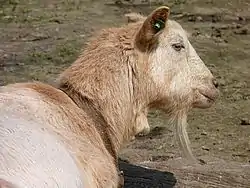bārda
Latvian

Bārda

Kazas bārda
Etymology
From Proto-Balto-Slavic *bardā́ˀ (with lengthening: *-àr- > -ā̀r-), from Proto-Indo-European *bʰardʰeh₂ (“beard”), from the stem *bʰar- (“projecting forward; tip, point; bristle, awn”), which is perhaps a form of *bʰer- (“to cut, to grate, to split, to hit”). Cognates include Lithuanian barzdà (< *barzdā-, a parallel form of *bardā-, with an extra z perhaps because of d:zd phonetic variation), Old Prussian bordus, Proto-Slavic *borda (Old Church Slavonic брада (brada), Russian борода (boroda), Czech brada (“beard, chin”), Polish broda (“beard, chin”)), Proto-Germanic *barda- (Old High German bart, German Bart, Old English, English beard), Latin barba (< *farba).[1]
Pronunciation
- IPA(key): [bàːɾda]
Audio (file)
Noun
bārda f (4th declension)
- (anatomy) beard (hair that grows on the cheeks and chins)
- vaigu bārda ― sideburns (lit. cheek beard)
- sirma bārda ― gray beard
- kupla bārda ― bushy beard
- skūt bārdu ― to shave a beard
- audzēt bārdu ― to grow (lit. raise) a beard
- biezi, melni bārdas rugāji noseguši zodu un vaigus ― thick, black beard stubbles covered (his) chin and cheeks
- (of animals) beard (hair, hair-like formation on the lower jaw)
- āža, kazas bārda ― goat beard
- bārdas zivs ― beard(ed) fish
Declension
Declension of bārda (4th declension)
References
- Karulis, Konstantīns (1992), “bārda”, in Latviešu Etimoloģijas Vārdnīca (in Latvian), Rīga: AVOTS, →ISBN
This article is issued from Wiktionary. The text is licensed under Creative Commons - Attribution - Sharealike. Additional terms may apply for the media files.